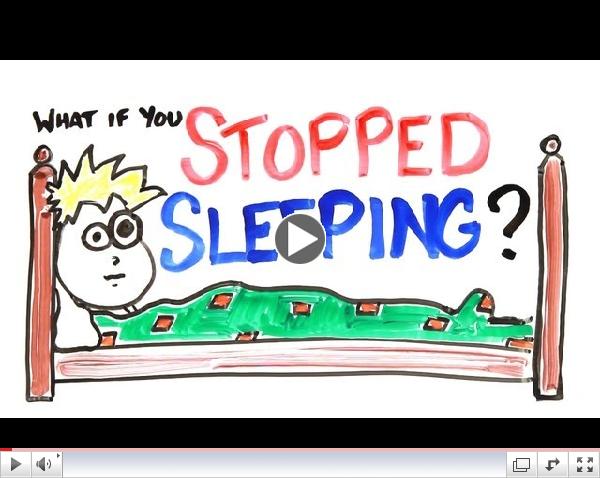|
Q. How important is a good night of sleep to my well-being and how much do I need?
|
A good laugh and a long sleep are the best cures in the doctor's book. ~Irish Proverb
Over the years the Dr. Oz Show has produced a number of episodes that focus on sleep and the lack of it. The topics have ranged from sabotaging your sleep, sleep tips, a juice even a pink noise to help you sleep.
Being sleepy seems to be a popular topic and so is the treatment. To help you sleep better there are sleep centers, specialized equipment to monitor sleep and even surgery to help you sleep better (snoring.) Sleeplessness is so prevalent it may be soon classified by the media as the next medical epidemic!
Our lifestyle encourages sleeplessness and in some situations encouraging it. We add to the mix when we wake up in the morning to pump ourselves up with a jolt of caffeine or two, too much unhealthy fatty food, tons of sweets and alcohol making your body kind of a "time bomb" ready to go off at any second. Not really conducive to relaxing sleep would you say?
When you miss valuable sleep you're not just missing a little shut eye; over time your are creating a cascade of health issues that take your money and time from your work and your family.
I recommend you start with the basics of understanding sleep and what goes into great sleep habits because .... Loss of sleep increases your risk of death from all causes.In the " Whitehall II Study," British researchers looked at how sleep patterns affected the mortality of more than 10,000 British civil servants over two decades. The results published in 2007, showed that those who had cut their sleep from seven to five hours or fewer a night nearly doubled their risk of death from all causes. Lack of sleep causes serious chronic medical conditions such as:- High blood pressure
- Heart attack
- Heart failure
- Stroke
- Obesity
- Psychiatric problems, including depression and other mood disorders
- Attention Deficit Disorder (ADD)
- Mental impairment
- Fetal and childhood growth retardation
- Injury from accidents
- Disruption of bed partner's sleep quality
- Poor quality of life
According to some estimates, 90% of people with insomnia -- a sleep disorder characterized by trouble falling and staying asleep -- also have more than one medical condition related to the lack of sleep such as heart failure and stroke.
Loosing sleep and depression are closely linkedIn a 2007 study of 10,000 people, those with insomnia were five times as likely to develop depression as those without. In fact, insomnia is often one of the first symptoms of depression. Insomnia and depression feed on each other. Sleep loss often aggravates the symptoms of depression, and depression can make it more difficult to fall asleep. On the positive side, treating sleep problems can help depression and its symptoms, and vice versa. Loosing sleep and weight gain happensAccording to a 2004 study, people who sleep less than six hours a day were almost 30 percent more likely to become obese than those who slept seven to nine hours. This may be because not getting enough sleep seems to stimulate appetite for cravings for high-fat, high-carbohydrate foods. Missed sleep accelerates agingThe article Sleep N Beauty claims sleep may be the world's best beauty treatment. The article goes on to say people who do not get enough sleep you can see more fine lines and wrinkles, dark circles crop up under their eyes and their complexion turns pale, dull and droopy. Swedish researchers say there's an important link between sleep and your physical appearance. In a study published in the British Medical Journal, researcher John Axelsson and his team at the Karolinska Institute in Stockholm found that sleep-deprived individuals appear less healthy, more tired, and less attractive than those who have received a full night's worth of sleep. Lack of sleep causes increased signs of early aging such as weight gain, wrinkles (oxidative stress) and fatigue.
|
A. Experts agree 7+ hours of sleep is needed for your body to repair and recharge.
|
We tend to think of sleeping as a waste of time, however it is far from it. The things you do while you are sleeping make it possible for you to do the things you do while you are awake. Make sense?
We learned from the National Sleep Foundation what happens when we sleep. Sleep helps us thrive by restoring body functions such as rebuilding our immune system, repairing muscle, consolidating memories, mental processing of information and regulating our hormones to stimulate cell growth and keep our appetite in check.
HOW MUCH SLEEP
What the medical (western) experts say ...
According to SleepGuide.org while sleep requirements vary slightly from person to person, most healthy adults need between seven and a half to nine hours of sleep per night to function at their best. Medical studies show for those who get less than 5 hours of sleep less that that there's an higher risk of heart disease, mood disorders (depression, anxiety), diabetes and decreased immunity (autoimmune diseases, allergies, colds, flu).
What the Ayurvedic (eastern) medicine experts say ...
Ayurvedic medicine reminds us about something that our ancestors did without thinking, naturally - to follow the rhythms of nature. When the sun goes down, time to go to bed, when the sun rises, time to get up, etc. Ayurveda practitioners have long taught the more sleep we get before midnight the more restorative the sleep is. Ayurvedic medicine instructs us go to sleep before 10 p.m. and wake up before 6 a.m. Why? Body rhythms. The rhythm of our body has sleep and wake cycles. Have you noticed you feel sleepy some parts of the day and more awake during other parts of the day. You may have experienced the 3 PM slump. This is rhythm of our body. If you would like to wake up easier and fall asleep easier try waking up before 6 a.m. and going to bed before 10 p.m..
GOOD SLEEP HYGIENE
How is your sleep hygiene? Sleep hygiene is referred to as a variety of different practices that are necessary to have normal, quality nighttime sleep and full daytime alertness. Are you doing these? - Avoid stimulants such as caffeine, nicotine, and alcohol too close to bedtime.
- Exercise can promote good sleep, but not close to bedtime.
- Food can be disruptive right before sleep, so avoid eating near bedtime.
- Ensure adequate exposure to natural light by spending time outside or with the window curtains open.
- Establish a regular relaxing bedtime routine.
- Go to bed and wake up at the same time every day.
- Associate your bed with sleep.
During the light sleep if you hear a noise, see a light, look at the clock or experience other distractions you will wake up. To prevent fully waking up use a sleep mask to keep those eyes closed and ear plugs to keep the noise out. As cute as that pet is you have, keep them out of your bed. You both will sleep better.If you wake up because you're thirsty or hungry, keep a light snack and water by the bed. Use a night light with a blue bulb if you get out of bed. FOODS THAT HELP YOU SLEEP | | Food to Help You Sleep |
Food effects sleep too. The more whole foods you eat the better you will sleep. Foods to eat more of to rest better are soy products (soy milk, tofu, soybeans), fruits, vegetables, whole grains (rice, pasta, breads), beans, lentils, nuts and eggs.
Chamomile tea will help you to rest if taken just before bedtime. Dr. Oz recommends the Best Teas for Stress and Anxiety here<< these will help you sleep too.
Foods that may keep you awake or interrupt your sleep are all forms of caffeine, sweets (sugar) and starchy vegetables eaten near bedtime.
 DON'T DON'TDon't forget to plan for a good nights sleep just like you do for every other part of your life. In our fast paced world good sleep does not just happen. You have to make time for it!
 DO DO Do ask for help. There are also,herbs that can add to your sleep regimen. However, herbs are medicine so always get advice from a health coach, a doctor or other reputable medical professional before adding to your sleep program.
|
What if you stopped sleeping?
|
 | | What If You Stopped Sleeping? |
|
The mind body connection to sleep | | 3 Exercises to Overcome Insomnia, Stop Thinking so Much, and Get a Good Night's Sleep |
|
|
DEAL OF THE WEEK - $10 Cash Back on Juice Plus+
|
Sleep better and wake up better with Juice Plus+ Whole Food Nutrition
supporting your healthy immune system,
protecting your DNA and your body knows what to do with it.
See what the medical experts and the clinical experts say about the most
researched whole food nutritional product of it's kind.
 | | Promote DNA Health with Juice Plus+ |
|
 Thank you for following Wellness Wednesday.
We're looking to answer your burning questions to help you find the right "mix" to make your life healthier.Please answer this quick survey to send us your questions and let us know what's working and what's not. We want to hear from you.
Your partners in health,

Certified Health Coach
Wellness Consultant
|
|